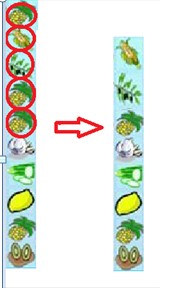LianLianKan
Time Limit: 2000/1000 MS (Java/Others) Memory Limit: 32768/32768 K (Java/Others)
Total Submission(s): 243 Accepted Submission(s): 123
Problem Description
I like playing game with my friends, although sometimes look pretty naive. Today I invent a new game called LianLianKan. The game is about playing on a number stack.
Now we have a number stack, and we should link and pop the same element pairs from top to bottom. Each time, you can just link the top element with the same-value element. After pop them from stack, all left elements will fall down. Although the game seems to be interesting, it's really naive indeed.

To prove I am wisdom among my friends, I add an additional rule to the game: for each top element, it can just link with the same-value element whose distance is less than 5.
Before the game, I want to check whether I have a solution to pop all elements in the stack.
Now we have a number stack, and we should link and pop the same element pairs from top to bottom. Each time, you can just link the top element with the same-value element. After pop them from stack, all left elements will fall down. Although the game seems to be interesting, it's really naive indeed.

To prove I am wisdom among my friends, I add an additional rule to the game: for each top element, it can just link with the same-value element whose distance is less than 5.
Before the game, I want to check whether I have a solution to pop all elements in the stack.
Input
There are multiple test cases.
The first line is an integer N indicating the number of elements in the stack initially. (1 <= N <= 1000)
The next line contains N integers ai indicating the elements from bottom to top. (0 <= ai <= 2,000,000,000)
The first line is an integer N indicating the number of elements in the stack initially. (1 <= N <= 1000)
The next line contains N integers ai indicating the elements from bottom to top. (0 <= ai <= 2,000,000,000)
Output
For each test case, output “1” if I can pop all elements; otherwise output “0”.
Sample Input
2 1 1 3 1 1 1 2 1000000 1
Sample Output
1 0 0
代码:
#include<stdio.h>
#include<string.h>
__int64 num[1005];
int visit[1005];
int n;
int fun()
{
for(int i=1;i<=n;i++)
{
if(!visit[i])
{
int k=2;
for(int j=i+1;j<=n&&k<=5;j++)
{
if(num[i]==num[j])
{
visit[i]=visit[j]=1;
break;
}
}
if(!visit[i])
return 0;
}
}
return 1;
}
int main()
{
while(scanf("%d",&n)!=-1&&n)
{
memset(visit,0,sizeof(visit));
for(int i=1;i<=n;i++)
scanf("%I64d",&num[i]);
if(n%2==0&&fun())
printf("1\n");
else
printf("0\n");
}
return 0;
}


